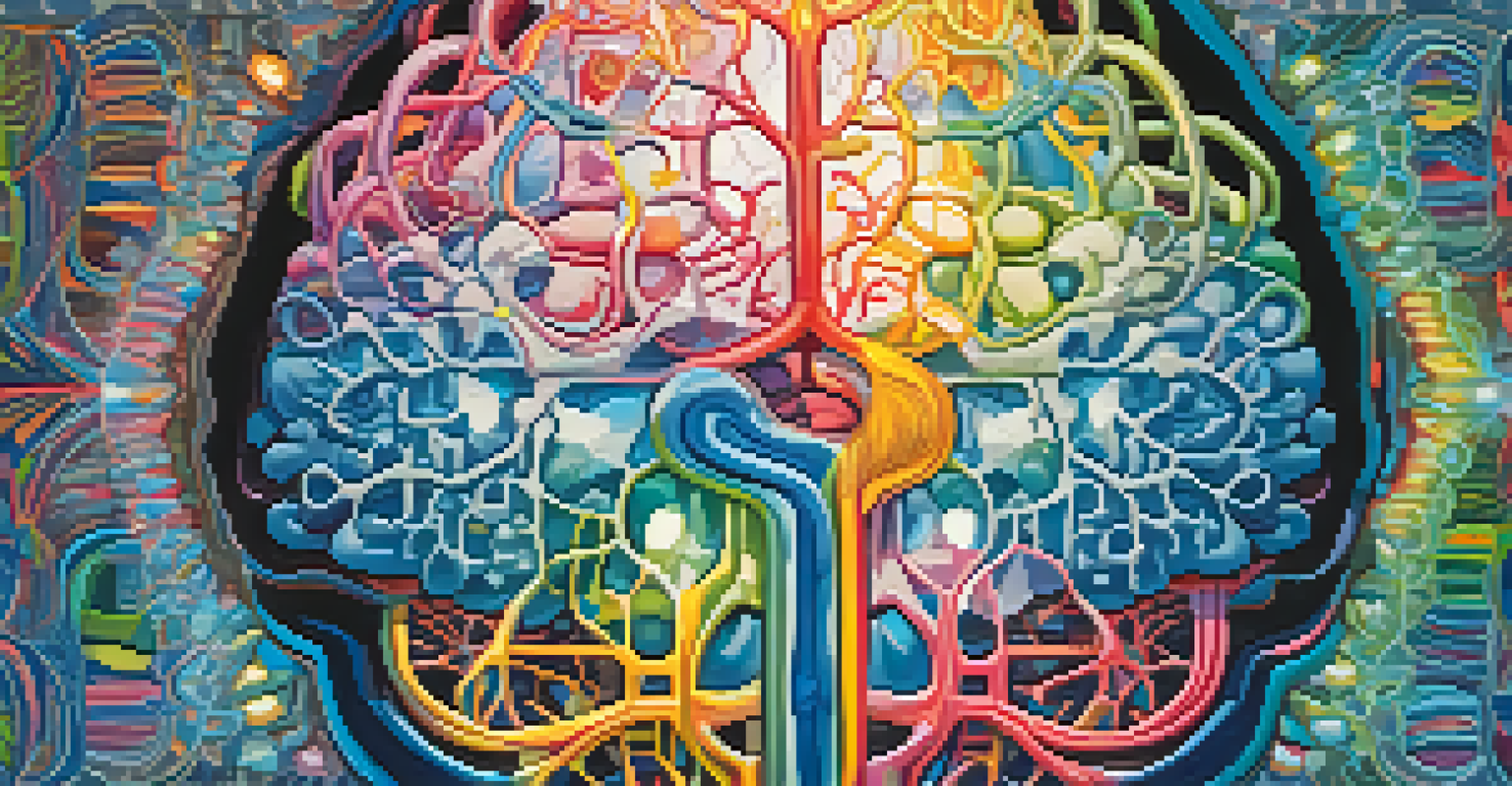Neuroscience and Spiritual Experiences: A Synergistic View

Understanding Spiritual Experiences: A Brief Overview
Spiritual experiences often evoke profound feelings of connection, purpose, and transcendence. These moments can range from a sense of unity with the universe to deep feelings of inner peace. Many individuals describe these experiences as life-changing, providing insights that shape their beliefs and values. By examining these experiences, we can begin to understand their significance in human life and culture.
Science without religion is lame, religion without science is blind.
From ancient texts to modern-day testimonials, spiritual experiences have been documented across various cultures and religions. This universal aspect of spirituality suggests a fundamental human need for connection with something greater than oneself. Whether through meditation, prayer, or nature, people seek ways to tap into these deeper experiences. Understanding this drive can help bridge the gap between science and spirituality.
As we explore the intersection of neuroscience and spirituality, it’s essential to recognize that these experiences aren't just random occurrences. They often reflect underlying psychological and physiological processes that can be studied scientifically. This synergy between neuroscience and spirituality paves the way for a richer understanding of both realms.
The Role of Neuroscience in Understanding Spirituality
Neuroscience provides tools to explore how the brain processes spiritual experiences. Studies using brain imaging techniques, like fMRI, have shown that certain areas of the brain light up during moments of deep meditation or prayer. These findings suggest that our brain structures may be wired to seek out spiritual experiences, providing a biological basis for what many perceive as transcendent moments.

For instance, the temporoparietal junction (TPJ), involved in self-awareness and empathy, has been linked to experiences of unity and connectedness. When activated, individuals often report feelings of oneness with their surroundings or a higher power. This connection between brain function and spiritual experiences highlights how our biology influences our understanding of spirituality.
Neuroscience Explains Spirituality
Research shows that specific brain areas are activated during spiritual experiences, linking biology to our quest for transcendence.
By studying these neural mechanisms, scientists aim to unravel how spirituality can positively impact mental health. For example, practices like mindfulness and meditation have been shown to reduce stress and anxiety, leading to improved emotional well-being. This intersection of neuroscience and spirituality offers promising avenues for therapeutic practices that promote holistic health.
The Psychological Aspects of Spiritual Experiences
Psychology plays a crucial role in understanding spiritual experiences and their effects on individuals. Many psychologists argue that spirituality can serve as a coping mechanism during times of stress or grief. For example, people who turn to spiritual practices during challenging times often report increased resilience and a sense of purpose.
The mind is everything. What you think, you become.
Moreover, spiritual experiences can foster a sense of community and belonging. Engaging in group practices, such as worship or meditation circles, can create strong social bonds and support networks. These communal aspects of spirituality can enhance emotional well-being and provide a buffer against life's challenges.
However, not all psychological interpretations of spiritual experiences are positive. Some individuals may experience distress or confusion when grappling with profound spiritual insights. Understanding these psychological dimensions can help individuals navigate their experiences more effectively, leading to personal growth and a deeper understanding of their spirituality.
Spirituality and Brain Chemistry: The Impact of Neurotransmitters
Neurotransmitters, the brain's chemical messengers, play a significant role in our spiritual experiences. For instance, dopamine, often associated with pleasure and reward, can enhance feelings of joy during spiritual practices. Elevated levels of dopamine may contribute to the euphoric sensations often reported during deep meditative states or spiritual awakenings.
Similarly, serotonin, which regulates mood and emotional well-being, has been linked to feelings of connectedness and spirituality. Research suggests that practices like meditation can increase serotonin levels, promoting a sense of peace and enhancing spiritual experiences. This connection between brain chemistry and spirituality emphasizes the biological roots of our spiritual pursuits.
Spirituality Enhances Mental Health
Practices like meditation and mindfulness, influenced by spiritual beliefs, can significantly improve emotional well-being and resilience.
Understanding the interplay between these neurotransmitters and spiritual experiences can help us appreciate how our brain chemistry influences our quest for meaning. This awareness can also guide individuals in selecting practices that promote both mental health and spiritual fulfillment.
Cultural Perspectives on Neuroscience and Spirituality
Cultural beliefs and practices shape how individuals perceive spirituality and its relation to neuroscience. In many Eastern traditions, spirituality is often approached through practices like yoga and meditation, emphasizing a holistic understanding of body and mind. These practices have gained popularity in the West, leading to greater acceptance of integrating neuroscience with spiritual practices.
Conversely, Western perspectives on spirituality may focus more on individualism and personal experiences. This can create a divide between spiritual practices and scientific inquiry. However, as neuroscience continues to reveal insights about the brain's role in spiritual experiences, more people are beginning to appreciate the validity of both approaches.
By fostering a dialogue between different cultural perspectives, we can create a more inclusive understanding of spirituality. This synergy can lead to a richer exploration of how neuroscience can enhance spiritual practices across various cultures, ultimately benefiting individuals seeking connection and meaning.
Integrating Neuroscience and Spirituality in Daily Life
Integrating insights from neuroscience into daily spiritual practices can enhance the overall experience. For example, individuals can incorporate mindfulness techniques that have been shown to promote brain health and emotional well-being. This approach not only deepens the spiritual experience but also supports mental clarity and emotional balance.
Additionally, understanding the neuroscience behind spiritual practices can encourage individuals to explore new methods. For instance, learning about the benefits of meditation can inspire someone to incorporate it into their routine, fostering a deeper connection to their spirituality. This proactive approach can lead to transformative experiences that enrich both mind and spirit.
Cultural Views Shape Spirituality
Different cultural perspectives on spirituality and neuroscience create diverse practices, fostering a richer understanding of human experiences.
Ultimately, the integration of neuroscience and spirituality can empower individuals to take charge of their own spiritual journeys. By combining scientific understanding with personal exploration, people can cultivate practices that resonate with them, promoting a fulfilling and meaningful spiritual life.
Future Directions: Research and Spirituality
The future of research at the intersection of neuroscience and spirituality is promising. As technology advances, we can expect more sophisticated studies that delve deeper into the brain's role in spiritual experiences. This ongoing exploration could unlock new insights into how spirituality affects mental health and overall well-being.
Furthermore, interdisciplinary collaboration between neuroscientists, psychologists, and spiritual leaders can create a more holistic understanding of these phenomena. By combining expertise from various fields, researchers can develop comprehensive frameworks that address both the scientific and experiential aspects of spirituality.

As we continue to explore this fascinating synergy, we may discover new ways to support individuals on their spiritual journeys. This research not only holds the potential for personal transformation but can also contribute to community well-being, fostering a deeper appreciation for the interconnectedness of neuroscience and spirituality.